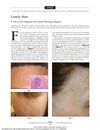 2 citations,
May 2018 in “Journal of The American Academy of Dermatology”
2 citations,
May 2018 in “Journal of The American Academy of Dermatology” Hypothyroidism patients with hair loss typically have thinning hair, smaller hair follicles, and normal hair shedding.
[object Object]  2 citations,
March 2004 in “Journal of the American Academy of Dermatology”
2 citations,
March 2004 in “Journal of the American Academy of Dermatology” The 60-second timed hair count is a reliable and simple way to measure hair shedding at home, showing older women tend to shed more hair than younger women.
 October 2024 in “Experimental Dermatology”
October 2024 in “Experimental Dermatology” The belief about hair shedding phases is likely incorrect and needs reevaluation.
 2 citations,
August 2020 in “Dermatologic Therapy”
2 citations,
August 2020 in “Dermatologic Therapy” Low ferritin and zinc levels, as well as anemia, are linked to more severe hair loss in Egyptian children with chronic hair shedding.
January 2022 in “Journal of Cosmetics, Dermatological Sciences and Applications” The serum increased hair density and was well-tolerated, but didn't affect hair thickness or shedding.
 75 citations,
October 1996 in “Dermatologic Clinics”
75 citations,
October 1996 in “Dermatologic Clinics” Chronic Telogen Effluvium is a hair loss condition in middle-aged women that usually doesn't lead to complete baldness.
 63 citations,
October 2011 in “Archives of Dermatology”
63 citations,
October 2011 in “Archives of Dermatology” Isolated long hairs at the original hairline can help diagnose Frontal Fibrosing Alopecia.
 11 citations,
July 2020 in “Journal of Cosmetic Dermatology”
11 citations,
July 2020 in “Journal of Cosmetic Dermatology” Sandalore® improves hair growth and quality in people with hair loss.
 9 citations,
December 2014 in “British Journal of Dermatology”
9 citations,
December 2014 in “British Journal of Dermatology” Hedgehog pathway inhibitors used for skin cancer can cause significant hair loss, which may improve after stopping the medication.
 2 citations,
January 2012 in “Journal of Cutaneous Pathology”
2 citations,
January 2012 in “Journal of Cutaneous Pathology” The author clarifies that alopecia areata incognito and diffuse alopecia areata are different types of hair loss with unique symptoms and challenges in diagnosis.
 January 2015 in “Springer eBooks”
January 2015 in “Springer eBooks” Understanding hair structure and growth is key for diagnosing hair diseases accurately.
 August 2013 in “Pharmacy Today”
August 2013 in “Pharmacy Today” Viviscal may modestly improve hair loss in women without adverse effects.
 September 1997 in “Journal of the European Academy of Dermatology and Venereology”
September 1997 in “Journal of the European Academy of Dermatology and Venereology” Adults can develop late-onset loose anagen syndrome, which may often be misdiagnosed.
 30 citations,
November 1996 in “Archives of Dermatology”
30 citations,
November 1996 in “Archives of Dermatology” UV rays can cause a type of hair loss known as telogen alopecia.
 July 1987 in “Reactions (Auckland)”
July 1987 in “Reactions (Auckland)” Oral minoxidil may slow male pattern baldness and cause body hair growth, but hair loss can happen after stopping it.
 September 2021 in “CRC Press eBooks”
September 2021 in “CRC Press eBooks” Alopecia areata incognita causes sudden hair thinning, responds well to steroids, and is more common in those with genetic hair loss conditions.
[object Object]  11 citations,
August 2013 in “International Journal of Cosmetic Science”
11 citations,
August 2013 in “International Journal of Cosmetic Science” The study suggests that a new protease inhibitor can make hair harder to pull out, potentially reducing hair loss.
2 citations,
July 2019 in “Indian dermatology online journal” A 17-year-old girl and her brothers have a rare hair condition with long eyelashes, thick eyebrows, and easily pluckable hair.
 1 citations,
December 2010 in “InnovAiT”
1 citations,
December 2010 in “InnovAiT” The document concludes that accurate diagnosis and appropriate management are crucial for treating various hair disorders, which have significant psychological impacts.
 January 2025 in “TURKDERM”
January 2025 in “TURKDERM” Alopecia areata incognito in children can be effectively treated with triamcinolone acetonide and supplements, leading to full hair regrowth.
 May 2012 in “CRC Press eBooks”
May 2012 in “CRC Press eBooks” Different types of hair loss within Telogen Effluvium are caused by various disruptions in hair growth cycles.
 41 citations,
July 2015 in “Clinical and Experimental Dermatology”
41 citations,
July 2015 in “Clinical and Experimental Dermatology” Psoriasis can cause temporary or permanent hair loss.
 12 citations,
June 2009 in “Journal of Cosmetic Dermatology”
12 citations,
June 2009 in “Journal of Cosmetic Dermatology” Loose Anagen Hair syndrome occurs in dark-skinned children and often improves on its own.
 10 citations,
August 2011 in “Clinics”
10 citations,
August 2011 in “Clinics” The author clarified that Alopecia Areata Incognita (AAI) and diffuse Alopecia Areata (AA) are different conditions and the case discussed was actually AA, not AAI.
 5 citations,
September 2017 in “Journal of Cosmetic Dermatology”
5 citations,
September 2017 in “Journal of Cosmetic Dermatology” A marine protein-based dietary supplement can safely boost hair growth and reduce hair loss in people with thinning hair.
 1 citations,
March 2014 in “Senses and Sciences”
1 citations,
March 2014 in “Senses and Sciences” A supplement with Serenoa repens improved hair loss in a patient.
 June 2024 in “Al- Anbar Medical Journal”
June 2024 in “Al- Anbar Medical Journal” Acute telogen effluvium can be resolved by addressing causes, but chronic telogen effluvium is harder to treat.
 February 2022 in “CRC Press eBooks”
February 2022 in “CRC Press eBooks” Hair disorders include hair loss, excessive hair growth, and ingrown hairs, with various treatments available depending on the cause.
 November 2014 in “British Journal of Dermatology”
November 2014 in “British Journal of Dermatology” Male hair loss is mainly due to thinner hair, not less hair.

A man had temporary hair loss after a spinal cord injury, with some permanent thinning remaining.



























